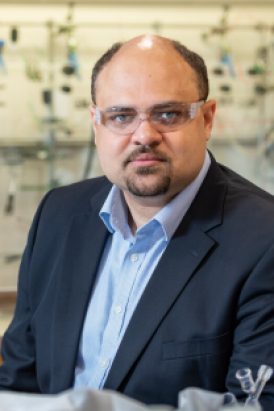News & Events
Charles C. L. McCrory, Ph.D.
Posted on September 4, 2020

When
Date - September 4, 2020
1:00 pm - 2:00 pm
What
Assistant Professor of Chemistry and Macromolecular Science & Engineering
Department of Chemistry
University of Michigan
Talk Title: The Electrochemical Conversion of CO2 with Polymer-Encapsulated Co Catalysts: Modulating Activity and Selectivity by Controlling the Catalyst’s Coordination Environment
Abstract:
One of the primary barriers to the large-scale implementation of intermittent renewable energy sources such as solar and wind is effective energy storage. The selective electrochemical reduction of CO2 in the CO2 reduction reaction (CO2RR) is a crucial strategy for storing energy from intermittent energy sources in the form of chemical bonds (e.g. solar fuels). Current state-of-the-art solid-state catalyst materials produce useful products such as methanol or ethylene, but typically do so non-selectively with a variety of gaseous and liquid products including H2 from competitive water reduction. Alternatively, molecular catalysts show promise for more selective reduction of CO2 to single products, typically CO or formic acid, but usually perform with lower overall activity compared to solid-state analogues. My research group is focused on the development of new catalytic systems that reduce CO2 with the selectivity of molecular catalysts but operate with the activity of solid-state catalytic materials.
In this talk, I will present some of our recent studies exploring the use of polymer encapsulation to control the chemical environment surrounding molecular electrocatalysts in order to increase catalytic activity and selectivity for the CO2RR. In particular, I will demonstrate that encapsulating cobalt phthalocyanine (CoPc), a mediocre CO2RR catalyst, within an encapsulating polyvinylpyridine polymer leads to a dramatic increase in the activity and selectivity for the CO2RR. Using a combination of electroanalytical and spectroelectrochemical approaches, I will illustrate how the encapsulating polymer surrounding the CoPc center modulates the primary, secondary, and outer coordination sphere of the catalysts, and I will discuss how modifying these coordination spheres has profound impacts on the catalytic activity, reaction selectivity, and mechanism of CO2 reduction.





